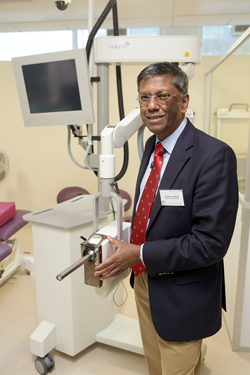NICE approves rectal cancer treatment brought to UK by The Clatterbridge Cancer Centre
Posted 8th October 2015

A pioneering non-surgical treatment for early-stage rectal cancer that was brought to the UK by The Clatterbridge Cancer Centre has now been formally approved by The National Institute for Health and Care Excellence (NICE).
The Papillon technique is a form of radiotherapy that developed as an alternative to surgery and was introduced to the UK in 1993 at The Clatterbridge Cancer Centre by Prof Arthur Sun Myint. The Centre remains the leading provider of Papillon nationally.
NICE approval of Papillon for the treatment of early rectal cancer in patients for whom surgery is not recommended is likely to raise awareness of it among patients and clinicians, and may increase the number of people opting to receive it. Rectal cancer is a form of bowel cancer, the third most common type in the UK.
As a form of contact radiotherapy, Papillon treatment involves a probe being placed next to the tumour so the radiotherapy can be delivered directly to it. Each treatment session lasts just a few minutes and people attend as outpatients.
Papillon is recommended for patients who are not fit enough for general anaesthesia. Another benefit is that it avoids the need for patients to have surgery which can result in them requiring a temporary or permanent stoma.
Professor Myint, Lead Papillon Clinician at The Clatterbridge Cancer Centre, commented: "The NICE approval will be of great benefit to older patients who may not be fit enough for the surgical treatment and younger patients who would otherwise need a stoma to treat their rectal cancer. It is very good to know that more patients in the UK will be able to get the benefits of the Papillon technique especially in the treatment of early diagnosed rectal cancer."
